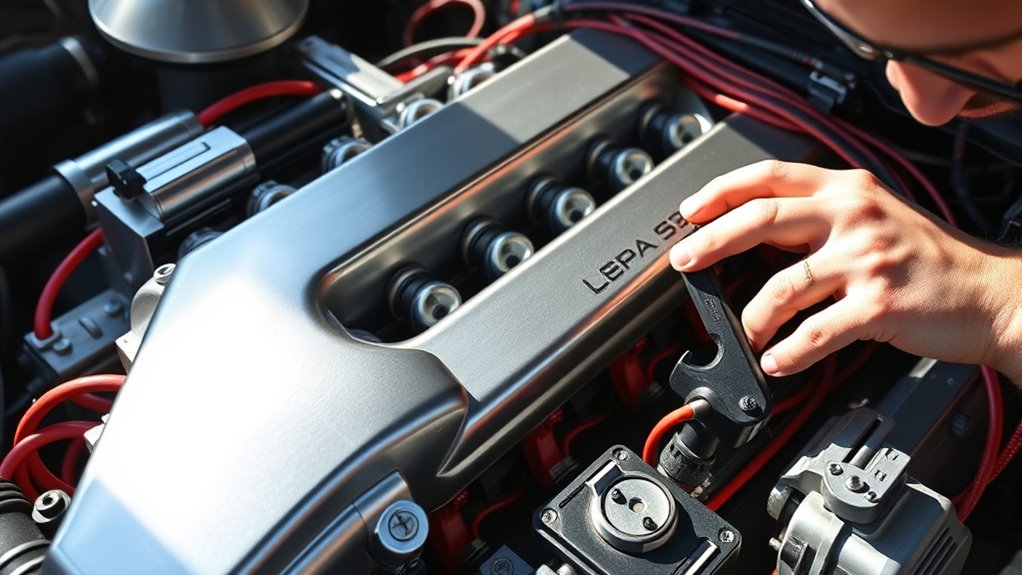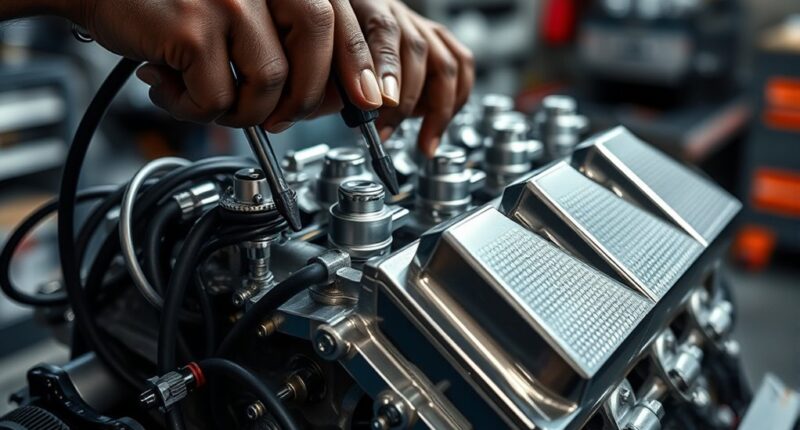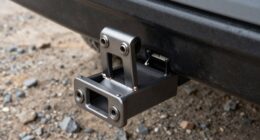To get reliable power from your L83 or L86 direct-injection V8, you should focus on precise ECU calibration that fine-tunes ignition timing, fuel delivery, and throttle response. Use the right tuning tools to adjust parameters safely, ensuring ideal performance without risking engine health. Proper calibration maximizes power and efficiency while keeping everything dependable. By following best practices, you’ll open up better power and driveability—learn more about how to make these adjustments effectively.
Key Takeaways
- Use professional tuning software to carefully adjust ignition timing and fuel maps for optimal power and safety.
- Ensure fuel delivery settings are calibrated to match modifications, maintaining proper air-fuel ratios under load.
- Incorporate direct-injection system considerations to prevent misfires and knocking during aggressive tuning.
- Balance performance gains with engine safety features like adaptive learning and safety limits.
- Conduct thorough testing and monitoring post-tuning to verify reliability and consistent power delivery.

Are you looking to boost the performance of your L83 or L86 V8 engine? If so, optimizing your engine’s tuning is the key to revealing more power and efficiency. The foundation of effective tuning begins with ECU calibration. Your engine control unit (ECU) manages crucial functions like ignition timing, fuel delivery, and idle speed. By recalibrating the ECU, you can fine-tune these parameters to enhance horsepower, torque, and overall responsiveness. Proper ECU calibration guarantees your engine runs smoothly and reliably, even as you push it closer to its performance limits.
Boost your L83 or L86 V8 with precise ECU calibration for improved power and reliability.
Fuel management plays a critical role in this process. The direct-injection system in the L83 and L86 engines demands precise fuel delivery to maximize power without sacrificing reliability. Tuning the fuel management system involves adjusting fuel maps to match your modifications, whether that’s a cold air intake, aftermarket exhaust, or forced induction. When done correctly, this results in a more consistent air-fuel mixture, better throttle response, and improved fuel economy when you’re not demanding maximum power. A well-tuned fuel system prevents issues like misfires, knocking, or lean conditions that can harm the engine over time.
To properly tune your V8, you should start by connecting a high-quality tuning device or software to reprogram the ECU. This allows you to modify parameters based on your specific setup and driving goals. Many tuners focus on optimizing ignition timing, fuel trims, and throttle response to extract the most from your engine while maintaining reliability. Remember, the goal isn’t just to increase horsepower but to do so safely and efficiently. Overly aggressive tuning without considering fuel management can lead to engine damage or inconsistent performance.
It’s also important to understand the direct-injection technology used in these engines, as it impacts how tuning adjustments should be approached for optimal results. Experienced tuners understand the intricacies of the direct-injection system and can tailor your ECU calibration to match your vehicle’s unique characteristics and your driving habits. They can also help you set up advanced features like adaptive learning and safety limits to protect your engine during aggressive driving.
Ultimately, tuning your L83 or L86 V8 involves a careful balance of ECU calibration and fuel management. When executed properly, it results in a reliable increase in power, better throttle response, and improved efficiency. With the right approach, you’ll enjoy a more responsive and powerful driving experience, all while maintaining the long-term health of your engine.
Frequently Asked Questions
How Does Fuel Quality Affect L83/L86 Tuning?
Fuel quality considerably impacts your L83/L86 tuning, especially regarding ethanol content and fuel additives. If you use high-ethanol fuel, it can cause timing issues and reduce power if not tuned properly. Poor-quality fuel with insufficient additives may lead to knocking and misfires. To maintain ideal performance, always choose high-quality fuel with appropriate additives and monitor ethanol levels, ensuring your tuning stays reliable and your engine runs smoothly.
What Are the Best Aftermarket Options for Boost?
Thinking about boosting your L83/L86? Why settle for stock power when turbo upgrades and supercharger kits are calling your name? These aftermarket options crank up the fun and horsepower, transforming your ride into a muscle machine. Just remember, with great boost comes great responsibility—fuel quality and tuning matter. So, pick reputable brands, follow installation instructions, and enjoy the thrill of reliable power on demand!
How Can I Improve Cold Start Reliability?
If you’re facing cold start issues, first check your ignition timing; incorrect timing can make starting difficult. Confirm your battery is healthy and your fuel system is clean, as these also affect cold starts. Using a quality fuel additive can help with fuel vaporization. Additionally, consider upgrading your engine control module (ECM) tuning to optimize cold start strategies, making your engine start more reliably in low temperatures.
What Maintenance Schedules Support Tuning Longevity?
You might think maintenance is tedious, but it’s key for tuning longevity. Regularly check spark plug gaps and guarantee ignition timing stays precise; these small steps prevent misfires and optimize performance. Consistent oil changes and fuel system cleanings keep your engine running smoothly. Don’t neglect these schedules—doing so maximizes your tuning efforts and keeps your V8 reliable and powerful for miles to come.
Are There Specific Tuning Pitfalls to Avoid?
When tuning your L83/L86 V8, avoid common pitfalls like improper ignition timing adjustments and excessive exhaust modifications. These can cause engine knocking, reduced reliability, and performance issues. Always verify your ignition timing is optimized for reliability, and be cautious with exhaust mods to prevent backpressure problems. Testing and fine-tuning within manufacturer guidelines help maintain engine longevity and prevent costly repairs down the line.
Conclusion
Tuning the L83 and L86 V8s is like fine-tuning a symphony—you’ll gain reliable power and smooth performance. By carefully adjusting your fuel maps and ignition timing, you turn a raw engine into a well-oiled machine that responds effortlessly. Remember, patience and precision are your best allies. With a little effort, you’ll keep these engines humming like a well-rehearsed band, delivering dependable power whenever you step on the gas.









